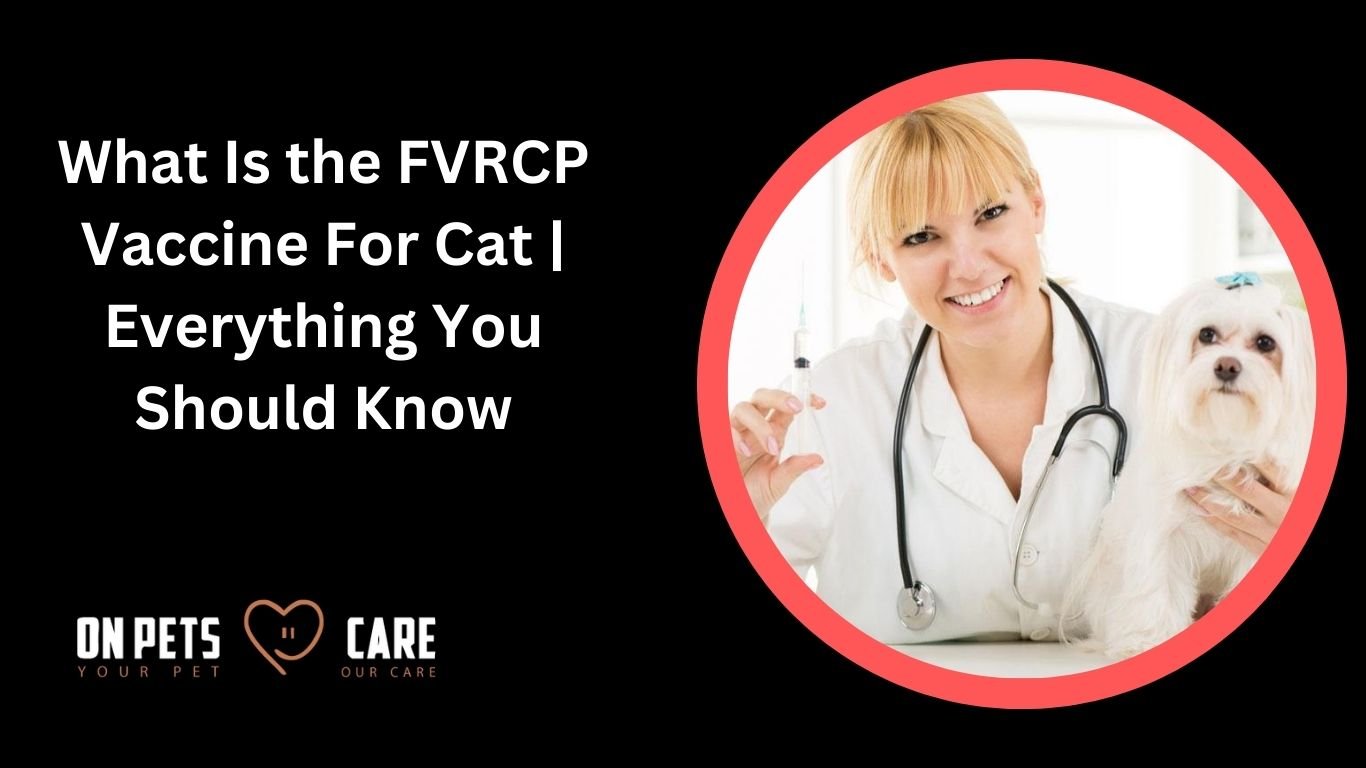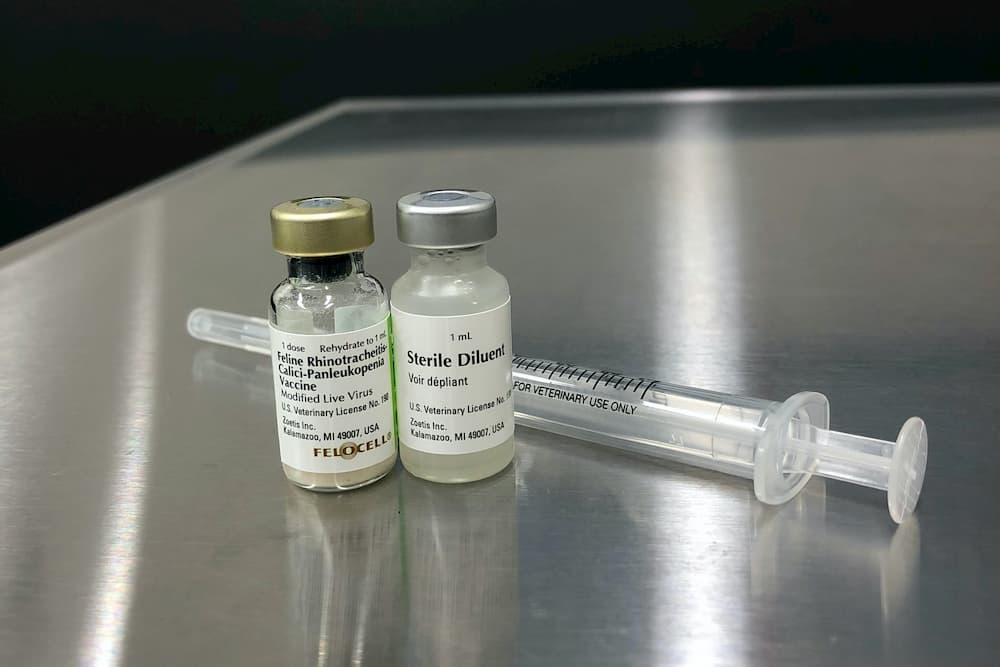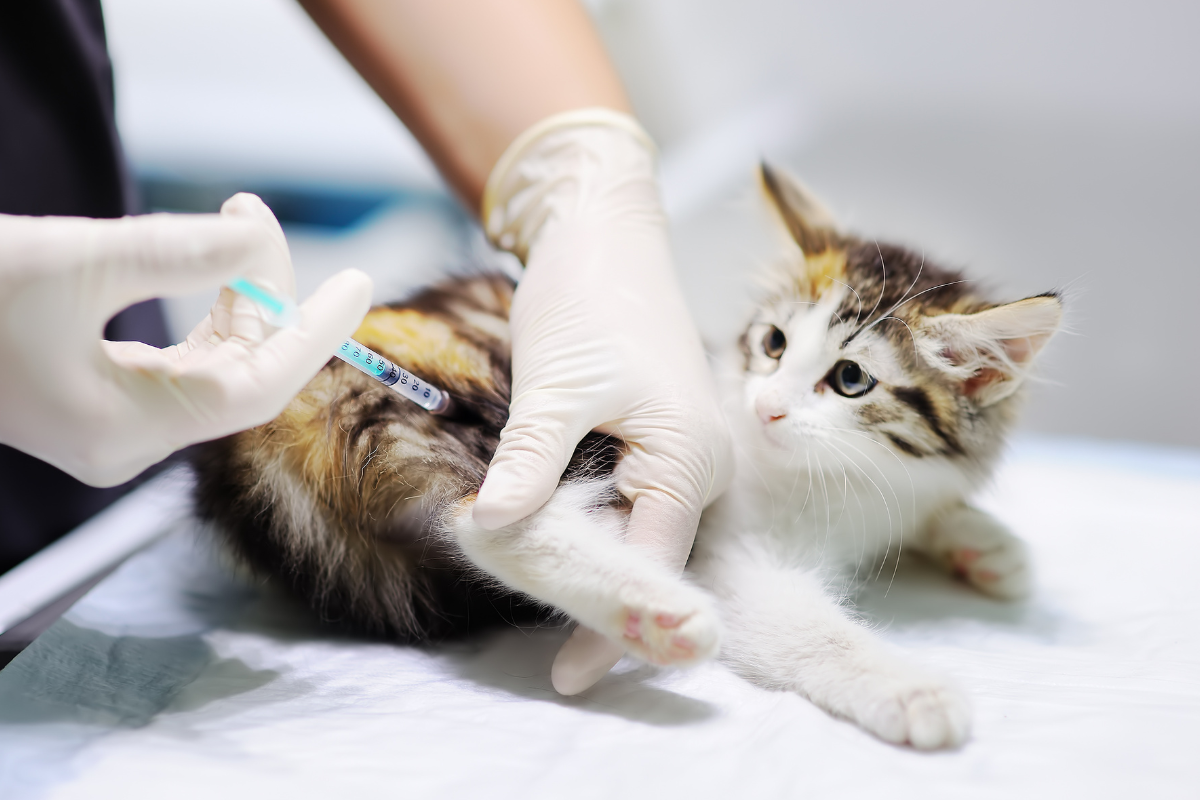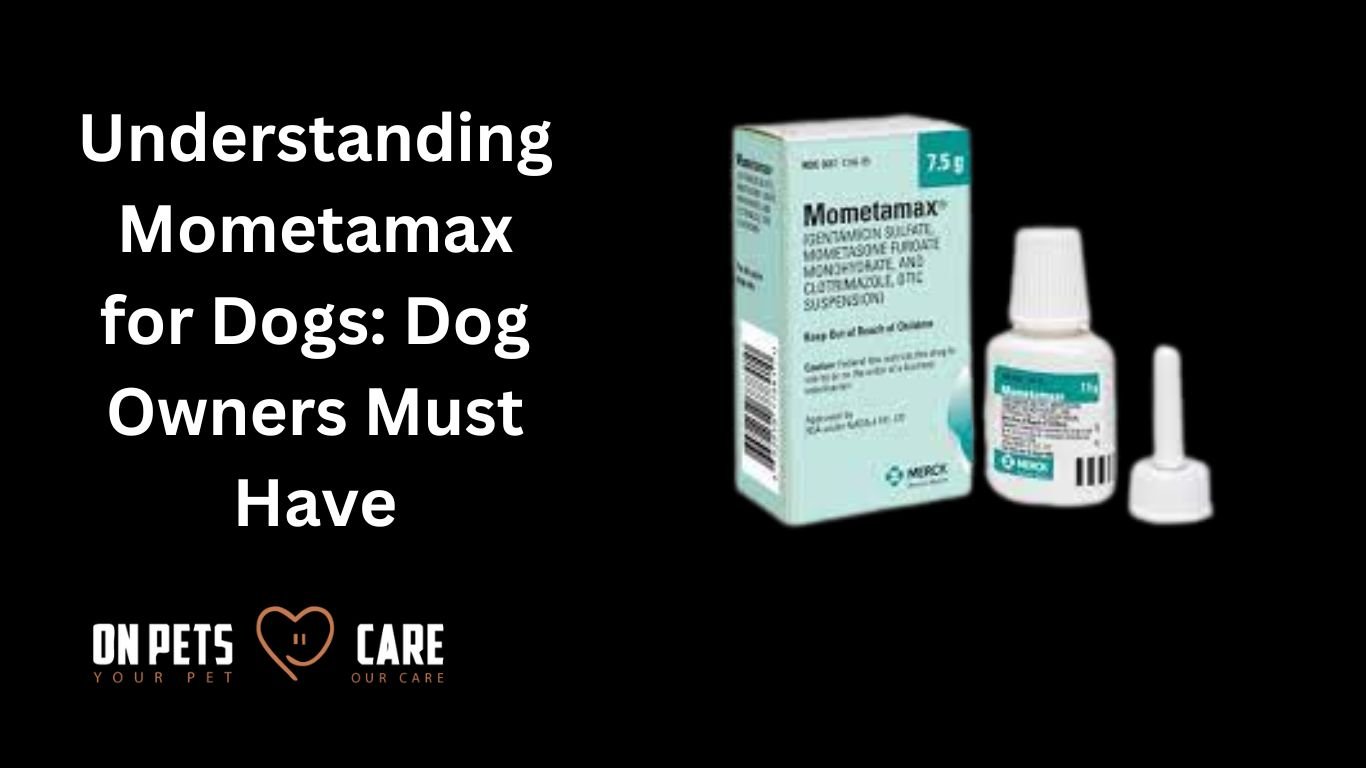What Is the FVRCP Vaccine For Cat | Everything You Should Know

As a cat owner, you know how important vaccinations are for your Pet’s health. One of the most crucial shots your cat can get is the FVRCP vaccine. But what exactly is it? The FVRCP vaccine protects against three major cat illnesses: rhinotracheitis, calicivirus, and panleukopenia (feline distemper). In this guide, we’ll cover what the FVRCP vaccine does, when your cat needs it, possible side effects, and why it’s essential for your cat’s health. Let’s start by learning more about this important vaccine.
What Is the FVRCP Vaccine For Cats?

If you’re a cat owner, you’ve probably heard about vaccinations. They’re like superhero shields, protecting your feline friend from nasty illnesses. One of the most crucial shots your kitty can get is the FVRCP vaccine. But what precisely is this potion of superheroes?
The Feline Viral Rhinotracheitis, Calicivirus, and Panleukopenia vaccination is also known as the FVRCP vaccine. Mouthwatering, huh? However, don’t be alarmed by the lengthy name.
Essentially, it’s a combo vaccine designed to arm your furball against three primary feline foes: rhinotracheitis (a type of herpes virus), calicivirus, and panleukopenia (also known as feline distemper).
What Does The FVRCP Vaccine For Cats Do?
Consider the FVRCP vaccination as a stronghold guarding your feline against panleukopenia, calicivirus, and rhinotracheitis. Rhinotracheitis and calicivirus are like the flu for cats, causing sneezing, coughing, and all-around kitty misery. Panleukopenia, on the other hand, is a severe and often deadly disease similar to parvovirus in dogs. It attacks the kitty’s white blood cells, leaving them vulnerable to infections.
By getting the FVRCP, you’re shielding your cat against these villains. It boosts their immune system, so if they ever come into contact with these viruses, their body can kick them to the curb before they even have a chance to unpack their bags.
The FVRCP vaccine for cats is a vital combination vaccine that protects cats against three severe and contagious feline diseases:
- Feline Viral Rhinotracheitis (FVR), also known as feline herpesvirus-1 (FHV-1), is a respiratory illness that causes symptoms like:
- Sneezing
- Runny nose
- Conjunctivitis (pink eye)
- Fever
- Loss of appetite
- Difficulty breathing
- Feline Calicivirus (FCV) is another upper respiratory infection that can cause:
- Sneezing
- Runny nose
- Mouth ulcers
- Difficulty breathing
- Pneumonia
- Arthritis
- Feline Panleukopenia (FPL), also known as feline distemper, is a highly contagious and potentially fatal illness that attacks a cat’s rapidly dividing cells, especially in the bone marrow and intestinal lining. Symptoms include:
- Vomiting
- Diarrhea
- Loss of appetite
- Lethargy
- Dehydration
- Weakened immune system
FVRCP Vaccine Schedule

Now, you might wonder, “When should my furball get this superhero shot?” Well, just like superheroes, they need to start training early. At six to eight weeks of age, kittens usually receive their first FVRCP vaccination. After that, until they are about 16 weeks old, they will require booster doses every 3 to 4 weeks.
But hey, don’t worry about keeping track of all those dates. I’ve whipped up a handy-dandy table to make things easier for you:
| Age of Kitten | FVRCP Vaccine Schedule |
|---|---|
| 6-8 weeks | First dose |
| 10-12 weeks | Second dose |
| 14-16 weeks | Final dose |
Possible Side Effects of FVRCP Vaccine
Now, the FVRCP vaccine for cats may cause specific adverse effects, just like any superhuman serum. Let me reassure you, though, that they are typically moderate and transient. A slight fever, discomfort at the injection site, or a brief loss of appetite are typical side effects. It’s like when you get a flu shot and feel under the weather for a day or two. Your cat might experience similar symptoms but should bounce back in no time.
In rare cases, some kitties might have an allergic reaction to the Vaccine. Signs of an allergic reaction include difficulty breathing, swelling around the face or neck, or vomiting. If you notice these symptoms, don’t hesitate to contact your vet immediately.
The FVRCP vaccine is generally very safe for cats, but like any medication, there’s a slight chance of side effects. These are usually mild and short-lived, lasting a day or two.
Common side effects:
- Injection site pain or swelling is normal and typically disappears in a day or two.
- Fever: Mild fevers, up to 103°F, are typical and should go away in a day or two.
- Decreased appetite: A day or two following the immunization, your cat may show decreased interest in eating.
- Decreased activity: Your cat might be less active than usual for a day or two.
Rare, more severe side effects:
- Allergic reactions can range from mild (hives, facial swelling) to severe (anaphylaxis, difficulty breathing). Contact your veterinarian immediately if you notice any signs of an allergic reaction.
- Vomiting: This is uncommon but can occur.
- Diarrhoea: This is also uncommon but can occur.
- Difficulty breathing: This is a very rare but severe side effect. • Call your veterinarian immediately if your cat has trouble breathing following the immunization.
- Recall that the advantages of the FVRCP vaccination considerably exceed the possibility of adverse effects. Vaccination is the best defence against dangerous and often fatal infections for your cat. Consult your Veterinarian if side symptoms are causing you any concern. They can advise you on whether the vaccination is appropriate for your cat.
FVRCP Vaccine For Cats: Why Do Cats Need to Be Vaccinated?
You might be thinking, “Why bother with vaccines? My cat’s an indoor-only kitty.” Well, even indoor cats aren’t entirely safe from the baddies. You could unknowingly bring in the virus on your shoes or clothes, or it could hitch a ride on another pet. Plus, think about it this way: would you rather fight off a virus with your cat’s immune system or with the help of a vaccine? I know which side I’d choose!
Vaccinating your cat not only protects them but also helps create what’s known as herd immunity. The more vaccinated cats, the harder it is for the virus to spread. It’s like building a force field around your whole community!
Is FVRCP Vaccine for Cats Worth It?
Ah, the million-dollar question: is the FVRCP vaccine for cats worth it? Well, is protecting your fur baby from potentially deadly diseases worth it? I’d say that’s a resounding yes!
Sure, vaccinations might cost a bit upfront, but consider them an investment in your cat’s health. Treating illnesses like panleukopenia can rack up some serious vet bills, not to mention the emotional toll it takes on you and your kitty.
So, in my book, the FVRCP vaccine is worth it. It’s like buying insurance for your cat’s health, something you hope you’ll never need, but you’ll be glad you have it just in case.
Benefits and Risks of FVRCP Vaccine for Cats

The FVRCP vaccine is a vital tool in protecting cats from three highly contagious and potentially life-threatening diseases:
Benefits:
- Highly effective: The FVRCP vaccine offers significant protection against:
- Feline Viral Rhinotracheitis (FVR): Reduces the severity and frequency of upper respiratory infections.
- Feline Calicivirus (FCV): Protects against severe illness, including pneumonia and arthritis.
- Feline Panleukopenia (FPL): Offers crucial protection against this highly contagious and often fatal disease.
- Herd immunity: Vaccination contributes to herd immunity, protecting not only individual cats but also those who cannot be vaccinated due to age or health concerns.
- Long-lasting protection: Depending on the vaccine type and individual cat, protection can last 1-3 years.
- Mild side effects: While uncommon, the following are possible:
- Soreness or swelling at the injection site
- Short-term fever
- Decreased appetite or activity
- Rare severe reactions: These are extremely uncommon but include:
- Severe allergic reactions
- Autoimmune reactions (very rare)
It’s crucial to remember:
- Benefits outweigh risks: The FVRCP vaccine far outweighs the minimal risks of side effects.
- Individual assessment: Discuss your cat’s lifestyle and health with your veterinarian to determine the appropriate vaccination schedule.
- Veterinarian consultation: If you have concerns about the vaccine or your cat’s health, consult your veterinarian for personalized advice.
Conclusion:
The FVRCP vaccine is best for your cat, protecting them from the villains of the feline world. So, if you haven’t already, talk to your vet about getting your kitty vaccinated today. Trust me, you and your cat will rest easier knowing they’re protected against the baddies!
FAQs
Q: What does the FVRCP vaccine protect against?
Answer: The FVRCP vaccine shields cats against three major illnesses: rhinotracheitis, calicivirus, and panleukopenia, safeguarding them from respiratory issues, gastrointestinal problems, and potential fatalities.
Q: When should kittens start receiving the FVRCP vaccine?
Answer: Kittens should begin their FVRCP vaccinations at 6 to 8 weeks old, followed by booster shots every 3 to 4 weeks until they’re around 16 weeks old, ensuring their immunity to these diseases develops effectively.
Q: What are the common side effects of the FVRCP vaccine?
Answer: Common side effects include mild soreness at the injection site and temporary lethargy. Although severe allergic reactions are rare, immediate veterinary attention is necessary if observed post-vaccination.
Q: Are indoor cats still at risk and need the FVRCP vaccine?
Answer: Yes, indoor cats should still receive the FVRCP vaccine. Despite reduced exposure to outdoor risks, viruses can enter homes through various means, necessitating vaccination to protect them from potential infections.
Q: How long does the protection from the FVRCP vaccine last?
Answer: Protection duration varies, but booster shots every 1 to 3 years after the initial series in kittenhood help maintain immunity. Consult your veterinarian for guidance on your cat’s specific vaccination schedule.





Leave a Reply